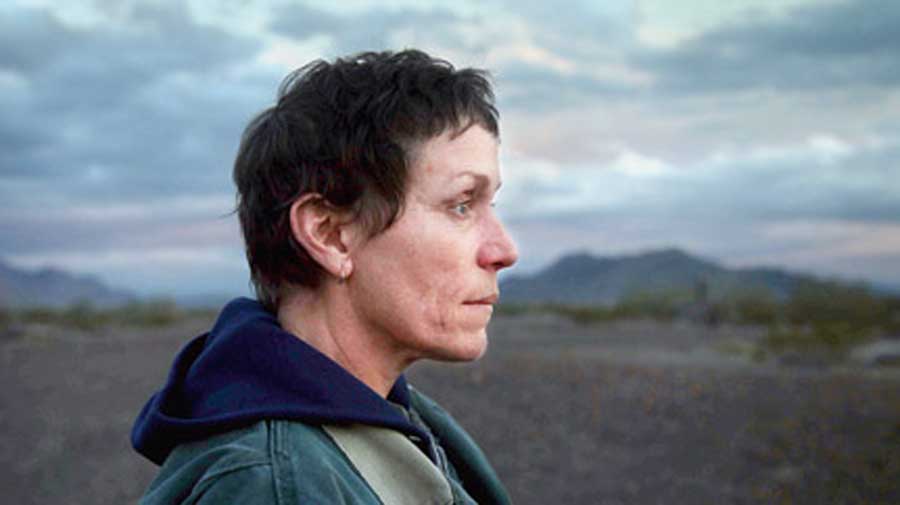A film is waiting to be made on Frances McDormand’s face. A face unflappable yet brimming with emotions that waft across in the blink of an eye but convey so much. You see that as she peruses the vast expanse of an almost-frozen field in Nomadland, much like she stared at the billboards, her eyes screaming out louder than what was written on them, in Three Billboards Outside Ebbing, Missouri. The 2017 film won McDormand a Best Actress Oscar. Nomadland — nominated in six categories at this year’s Academy Awards and currently playing in theatres — could well earn her a third golden statuette later this month.
So also the film’s director Chloe Zhao, who is increasingly being touted as a shoo-in for Best Director. In Nomadland, the Chinese-born Zhao subverts the road trip movie trope and creates the antithesis of The Great American Dream.
McDormand is Fern, a widow in her 60s who’s had to give up both her home and her old life in Empire, Nevada, that’s now reduced to a ghost town with the closing of the US Gypsum plant following The Great Recession. The year is 2012 and a stoic Fern, who we first see urinating in a field, packs up her meagre belongings — among them a set of prized dinner plates her father once gifted her and her dead husband’s jacket — and hits the road in a tumbledown van she names ‘Vanguard’.
What greets her is a tough life, but one that in many ways sets her free from the traditional ideals of society. In shedding both her emotional and physical baggage, Fern gains healing, strength, independence and purpose. She also learns that ‘home’ is where you make it, and it often resides within you.
As a film, Nomadland is minimal. There are no dramatic arches, the pace is languid and the storytelling is semi-documentary style. To be honest, the film has little meat or momentum, but Zhao creates a moving and meditative portrait where every frame seems momentous in its telling, with even the pauses holding weight. Nomadland expects tenacity from Fern, and a whole lot of patience from its audience. But the payoff is almost always satisfying.
As Fern embarks on a new life devoid of roots, she finds herself taking wings in the company of fellow nomads, with the film etching out a poignant and powerful message of community and humanity, even as it paints a terse portrait of capitalism’s human scraps. The film is pointedly relevant to our grim times, with its focus on the environment and the economy coming off as both memory and prophecy.
Maturity, restraint and intimacy define Zhao’s treatment of the lives of modern-day vagabonds. Fern quickly finds herself becoming part of a group of fellow nomads, all of whom care for each other. They are working-class heroes by day — Fern does everything from packing boxes at Amazon to cleaning roadside toilets — and a community sitting around a bonfire and singing songs at night.
In Nomadland, Zhao paints a picture of restrained beauty, with the film being Emersonian in some ways. Joshua James Richards’ camera gives the viewer a tour of the American West’s glorious sunsets, expansive fields and undulating roads, complemented by a pulsating piano score from Ludovico Einaudi.
A deep sense of authenticity imbues every frame of Nomadland. McDormand went full method, spending weeks in a van and doing duties at Amazon. Most of
the nomads we get to see in the film are, in reality, real-life nomads. Like Swankie (played by Charlene Swankie) who chooses to die of cancer on the road instead of being in a hospital. Bob Wells, who plays a fictional version of himself, hasn’t been able to get over his son’s suicide. Their lives may be grim in many ways, but the film is most often optimistic and uplifting.
But Nomadland’s semi-romanticisation of homelessness and poverty could well polarise the audience. Especially given that its source material — the 2017 non-fiction title Nomadland: Surviving America In The Twenty-First Century by Jessica Bruder — describes the brutal repercussions of the 2008 financial crash. But given the times we are living in, I would rather lean towards Zhao’s sunny interpretation than anything that’s even remotely pessimistic. And that’s because we all hope. Even when everything feels hopeless.
It’s only when Fern is interacting with her fellow nomads do we see her vibrant, alive and filled with a sense of purpose. Ultimately, she rejects a culture that has rejected her and that, in its true essence, is the message of Nomadland.
A film that tells us that real freedom means letting go, challenges us to take the road less travelled and holds out hope for a better tomorrow. Or as Fern says, “See you down the road”.










